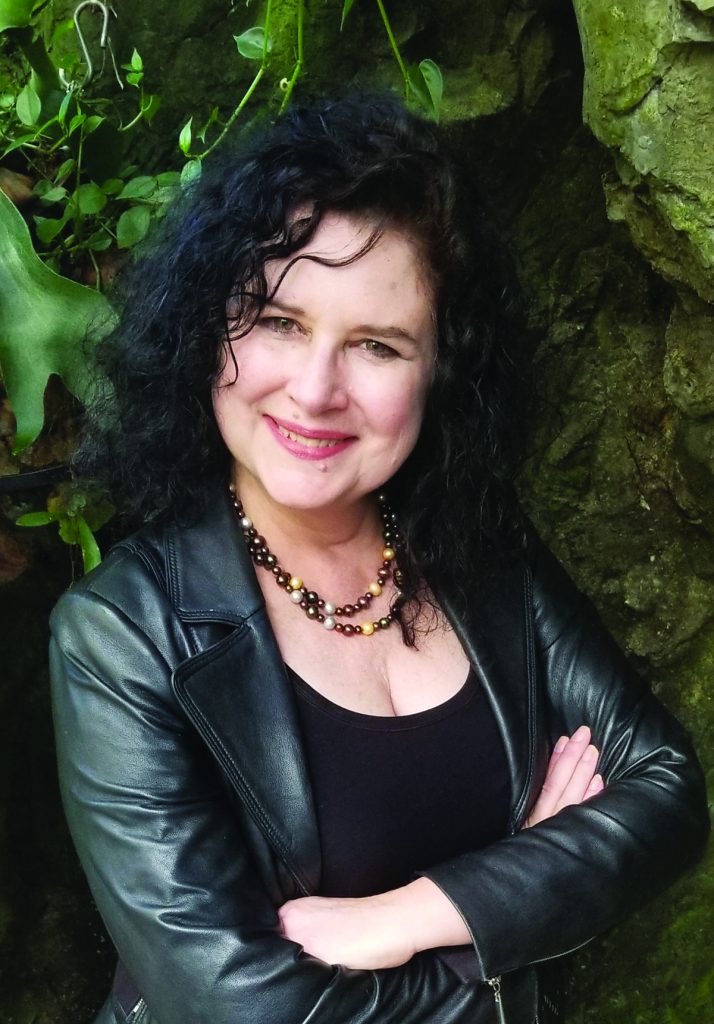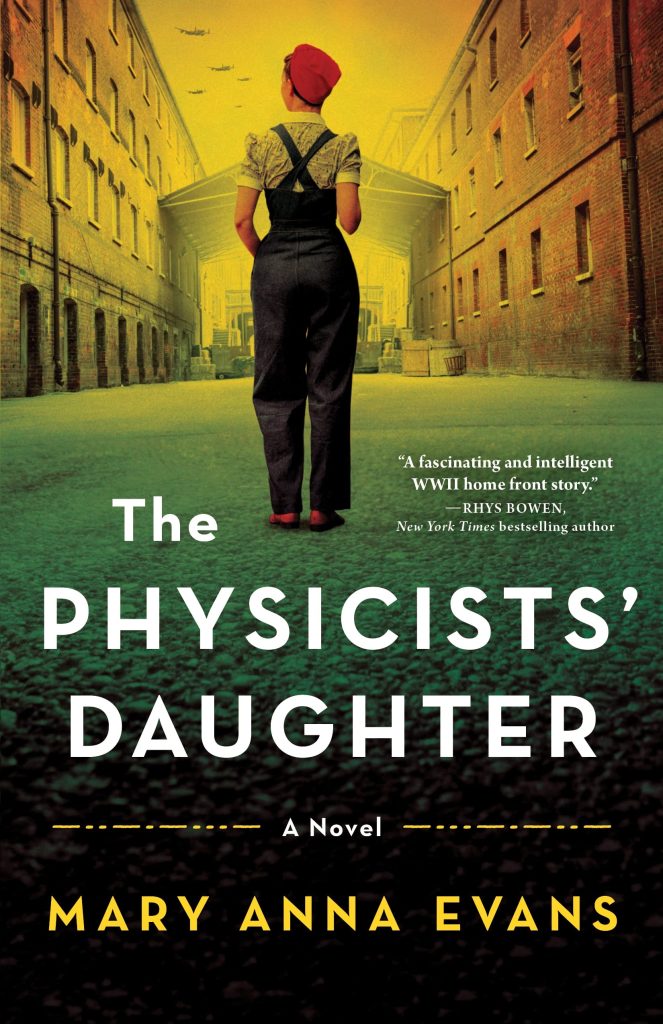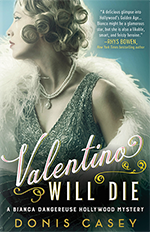
June’s Tell Me Your Story guest author is the inimitable Mary Anna Evans, whose new mystery The Physicists’ Daughter is a fascinating WWII era mystery – complete with spies and agents and saboteurs! Mary Anna is an award-winning author and writing professor, with degrees in physics and engineering – a background that, as it turns out, is perfect for writing The Physicists’ Daughter. Set in WWII-era New Orleans, the book introduces Justine Byrne, whom Mary Anna describes as “a little bit Rosie-the-Riveter and a little bit Bletchley Park codebreaker.” Mary Anna knows first-hand what Justine has to put up with as a woman just trying to do her job during a time that was less than welcoming to women with a solid education and and grounding in science.

Mary Anna Evans
If You Want Me To Do Something, Tell Me I Can’t.
When Donis asked me to write for her “Tell Me Your Story” series about my path to becoming an author, my first thought was “It’s was a really, really long path. These lovely people don’t have time for that.” But then I thought about the path to a particular book, The Physicists’ Daughter, which was just released this month. I do think there is a coherent and semi-succinct story to be told about how that book came to be.
I was born in Mississippi in the early 1960s. Given what I know about that time, I suppose there must have been people around me who didn’t expect much from me beyond marriage and children, but my parents disagreed. A college savings account was opened and money was deposited regularly. My mother asked my pediatrician whether she should find a school with a program for gifted students, which weren’t common back then, and Dr. Mary Clark said, “Whenever she shows an interest in anything, get her all the books on the subject that she wants.” And that is the wonderful childhood that I remember.
I also remember an immense enculturation into the trappings of femininity. Fortunately for me, I loved that stuff. Makeup (especially lipstick), hot curlers, high heels…bring it on! I was taught to be soft-spoken and eager to please. I was taught to want–and I did want–a husband and children. I was all girl. And yet…
I loved to read science fiction. I was fascinated with the stars and the planets. I asked for, and got, a toy astronaut named “Major Matt Mason.” I won school awards in math and science, as well as in English and social studies. And here we come to the crux of a 1970s going-to-college-as-a-girl dilemma: Should I choose the obvious major, English literature, or should I swim upstream? Should I choose something that girls almost never did…something that I wasn’t sure I could do…something that a lot of people at that time thought that women couldn’t or shouldn’t do?
In the end, I chose engineering physics and, looking back, I learned something about myself. If you want me to do something, tell me that I can’t.
My choice to study science when there were, at most, only a handful of women in my classes has brought me hard experiences and others that I wouldn’t trade for the world. I learned to listen to the whisper network and avoid the professors who didn’t think women belonged in their classroom, but I also had professors who were incredibly encouraging and so happy that we were there. I got to spend a summer flying in helicopters over the Gulf of Mexico to my offshore job. I got to teach community college FORTRAN to a roomful of nineteen-year-old men, which was a special pleasure when I was twenty-two and emphatically not a man. And I got to fly all over the country as an environmental consultant, which gave me an experience that I’ve now been thinking about for thirty years.
I was in rural Georgia at a plant that manufactured a product that you’ve heard of, and it had been doing so for quite some time. This meant that there was a real possibility of soil and groundwater contamination. My job was to assess whether the risk was sufficient to justify environmental testing that would be expensive and might complicate getting a loan that the business probably needed pretty badly. Because the location was so rural, my boss had figured out that it was cheaper to rent a plane and have one of our technicians, whom I will call Victor, fly me there. Victor knew how to fly planes because he had served as an Army Ranger on missions so classified that, had he died, his parents would never have known what happened to him.
The problem with this plan was that there would be nothing for Victor to do all day but stand around looking intimidating. Figuring that our client would not feel good about paying this man to be idle, our boss told Victor to carry a clipboard and follow me around while I did my inspection, nodding sagely from time to time and pretending to be useful. This should have worked fine. It did not.
When it came time for the inspection to begin, the plant manager handed us off to his assistant, a man who looked to be about retirement age. As soon as his boss was out of earshot, this malevolent excuse for a man hissed, “The last two little girls that came around here from the EPA got found years later, buried in drums out back.”
I should have called him on his bullshit. (Can I curse here?)* I should have found the plant manager and reported him. It is possible that I should even have told Victor to fly me home, away from this person who had just threatened my life. I know this now. But 1991 me was still steeped in mid-twentieth-century feminine non-confrontation. I just said, “I’m not from the EPA. Why don’t we get started?”
Thus began a surreal trip through a busy manufacturing plant, wherein I would ask a question–“Where is the outlet for this drain?”–and the malevolent excuse for a man would watch me speak and then turn his head, delivering his answer to Victor.
Every. Single. Time.
All. Morning. Long.
Victor and I found a diner and ordered our food. As we waited for our meat-and-three plates, he put both meaty hands flat on the table and leaned forward to emphasize what he was about to say. “Do you see what’s happening?”
“I do.”
He leaned forward a little more and held my eyes with an intense gaze. “Do you want me to take him out?”
I did not take him up on his offer. I said, “No, Victor. Please let our client live.”
Still, I cannot express my relief in hearing that someone else had seen what was happening to me and that they, too, were angry. Beneath my anger and beneath my focus on being a professional who got the job done was a little girl who thought that maybe, just maybe, she might be making a big deal over nothing. That little girl just could not let a man, any man, think that she might not be both utterly cool and utterly excellent at her job.
By now, you are wondering how this story relates to the topic at hand, the path I took to becoming an author. It becomes clear when you consider the title and topic of my new book, The Physicists’ Daughter. Set in 1944, it features female scientists who chose their path when pursuing science was far harder for them than it was for me, even on those days when I was the only woman in the room. My physicists’ daughter, Justine Byrne, grew up with ambitions of having a lab of her own, while watching her mother doggedly pursue her own science, even when it meant working from home and doing calculations while dandling a child on her lap. She watched her godmother shunted into the teaching assignments that the men wouldn’t take while working in an under-equipped lab in the space the men didn’t want. The women in this book are motivated, like I was, by intellectual challenge and by a refusal to listen when people suggest that there is anything that they cannot do.
As time went on, I left my work in environmental consulting, focusing instead on my children and on the books I wrote in my spare time. It took me many years and a lot of rejection to sell my first book, Artifacts, but in the almost twenty years since then, I’ve written, co-written, or edited nineteen books, with the twentieth one nearly finished. Is it any surprise that my protagonists–physicist Justine Byrne, archaeologist Faye Longchamp, and environmental scientist Larabeth McLeod–are focused on their work to the point that it’s probably not good for them, while also clinging to the good parts of the traditional femininity that we were all taught? They have empathy. They would not consider succeeding at someone else’s expense. They have compassion. I have not always lived up to those ideals, but I do still hold them, and I enjoy writing stories about strong, capable women very much.
Justine, Faye, and Larabeth have, in their way, helped me work through the highs and lows of having been born a woman in Mississippi in 1961. They have been good friends to me.
________________________
*Yes, please do.
________________________
Check out Mary Anna’s website at https://maryannaevans.com



More Places to Go
Donis on Facebook
Type M for Murder